Ken Abraham is an author or co-author of more than 80 books. Regularly appearing on the New York Times best-selling author lists, Ken is known as a master collaborator. He writes with public figures ranging from One Soldier’s Story with Bob Dole to Let’s Roll with Lisa Beamer. Ken and his wife are also good personal friends. His latest book When Your Parent Becomes Your Child is a deviation because instead of writing someone else’s story, Ken writes about his mother’s dementia, and its effect on the family. This moving story is one that will stay with you and give you a better understanding of what millions of families go through as they fight this disease.
Ken, this book is simply beautiful. I may never have met your mom in person, but after reading this book, I most definitely know her.  What was it like writing such a personal story as opposed to helping tell someone else’s?
What was it like writing such a personal story as opposed to helping tell someone else’s?
Of all the books I’ve written, When Your Parent Becomes Your Child was the most emotionally difficult book to write, yet oddly enough, it was also the easiest book I’ve ever written. The difficulty stemmed from the subject matter. Watching my mom make the journey through dementia was a heart-wrenching experience. But because I was simply sharing my own thoughts and feeling with readers, the words poured out easily.
In a real sense, I felt that I wasn’t merely writing about my mom, but I was expressing the emotions, questions, and concerns of many other people who could share similar stories, who might say, “That sounds exactly like what I have experienced with Mom or Dad.” My hope is that this book will stimulate conversations within families and encourage hope within the heart of every person who is now grappling with the myriad changes that take place When Your Parent Becomes Your Child.
Your mom suffered with dementia. Let me turn first to a few questions many ask about dementia. Is Alzheimer’s the same as dementia?
It’s not exactly a “chicken and egg” situation, and the lines do get blurry when we begin talking about Alzheimer’s and dementia. Technically, dementia is more of a “catch all” term; there are all sorts of dementias, the most familiar of which is Alzheimer’s.
Vascular dementia, with which my mom suffered, is the second most widely reported form of the disease. The symptoms of both Alzheimer’s and dementia are similar: memory loss, hallucinations, unusual fear, irritability, or suspicions. Hoarding, uncharacteristic use of profanity, inability to follow a conversation or a story, losing track of possessions, confusion over days, dates, or sadly, even diminishing ability to recognize friends or family members. All these can be indications that a loved one is developing dementia.
In my mom’s case, although I’m reluctant to admit it, part of the reason I wasn’t alarmed at her memory lapses was that I was clueless about the possible warning signs of Alzheimer’s. I just thought she was displaying the natural symptoms of aging as she moved into her mid-eighties. Even after she was diagnosed, I remained in denial for several months until my own research convinced me that what her doctor was describing was accurate.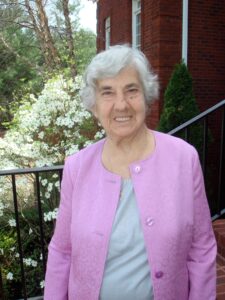
Are there stages of dementia? Do the symptoms get worse with time?
Dementias are not categorized in stages the same way as cancer (i.e. Stage 3 cancer, etc.), kidney disease, or other illnesses, but geriatric doctors are quick to recognize the onset of dementia and are amazingly accurate in predicting the progression of the disease. Most people with dementia live only five to fifteen years after they have been diagnosed. My mom passed away within three years of being diagnosed, although her mental abilities were already drastically reduced by the time we first took her to the doctor. To date, nobody has “come back” from Alzheimer’s or vascular dementia.
Perhaps the most noticeable difference between dementia and Alzheimer’s is that Alzheimer’s is more of a direct downhill slide, while dementia is often a “step-down” process. A person with vascular dementia may appear to be functioning well for a while; then something will happen—an emotion-evoking incident, a physical fall, an argument with a family member—and the person with dementia will slip a few steps downward. Sometimes, it might even appear that a person with dementia is functioning normally. “After all, Mom is getting older,” was my rationale for my mom’s mistakes. But then something else would happen that would cause her to spiral down lower on the mental totem pole. Nothing—not the various drugs or various physical activities recommended by her doctors—ever caused her to climb back up the steps after she had progressed downward.
Is there any treatment for dementia?
5 Lessons from Ken Abraham
- Keep a good sense of humor.
- Learn to change the subject.
- Understand you are not alone.
- Ask for help.
- Take time to be refreshed.
Certain medications can help calm a person afflicted with dementia, but presently no cure exists. Research is continuing and some new medications seem to hold promise, but no miracle drugs have been discovered. Yet almost every week, you can find another report touting some breakthrough with Alzheimer’s or dementia. “Buyer beware” is a good adage. A healthy skepticism will prove helpful until a cure is found. The Alzheimer’s Association posts free, current information in the ongoing battle against the disease, and I’ve found their material to be both optimistic and realistic.
Recently, beta-amyloid, a sticky protein produced in our brains, has gotten a lot of attention as a contributing cause of dementia. This protein is produced naturally in your body, but too much of it can clog communication between the neurons in your brain, causing breakdowns which lead to forgetfulness and other symptoms of dementia.
To avoid overproduction of this protein and thus helping to stave off dementia, most doctors encourage the same sort of heart-healthy diet and exercise that is important in preventing obesity, diabetes and other debilitating diseases. Staying mentally and socially active is important, as well.
What do you say to another family who is just learning a parent has dementia?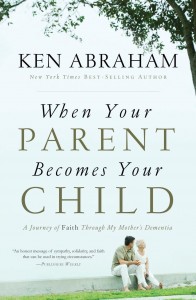
Keep a good sense of humor! A relative afflicted with dementia will say and do all sorts of quirky, funny things. You may as well laugh; it beats crying almost any time.
Another key principle is to learn to change the subject. Your family member who has dementia may become argumentative but, rather than trying to convince or correct him or her, simply change the subject. A short time later, the person with dementia won’t even remember the point of contention, and you will have saved yourself a lot of frustration, too. I know it sounds too simple, but this really worked for us.
It is also important to understand that you are not alone. More than five million people have been diagnosed with dementia, and the numbers will probably escalate dramatically over the next ten years due to the Baby Boomers moving into the dementia years. The Alzheimer’s Association estimates that more than 15 million people are caring for a loved one at home who is slipping mentally. Sometimes a family member might be embarrassed, but there is no reason to feel that way. Dementia can strike any family.
I’d also recommend a visit to a geriatric doctor, not simply a general practitioner or an internist. Geriatric doctors approach dementia differently than other physicians. They realize that all of their patients are going to die with dementia, so the emphasis is on, “How can we make life safe and enjoyable for your loved one as your family makes this journey together?”
Caregivers are under a lot of stress. What do you recommend to caregivers to alleviate some of the pressure?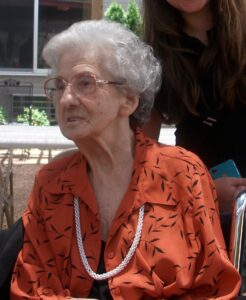
Most importantly, don’t be afraid to ask for help and don’t allow guilt to take over your life. You can only do so much, and caring for an aging loved one, especially a family member afflicted with dementia, can take a terrible toll on even the best of relationships. You need a break and you need not feel guilty for taking some time for yourself. It is easy to slip into a pattern where your entire world revolves around your loved one. That is noble, but the truth is, your family member with dementia is on an irrevocable course. If you allow the disease to destroy your relationships with your spouse, children, or other family members, you are not helping your loved one, and you are exacerbating the debilitating effects of the dementia. You will better serve your loved one if you take time to be refreshed physically, emotionally, and most important of all, spiritually.
This book opens a rare window into a journey many people will face. You share the highs and the lows, the funny stories and the ones that make you swallow hard. As you think about it, is there one story that pops into your mind that you would share with us?
Dealing with the physical amputations of my mom’s toes and more than a third of her right foot was the most heart-wrenching aspect of her downhill journey for me to observe. Although she was in severe pain, she rarely complained until the very end of her life. But the helplessness that those lost toes represented was emotionally difficult to handle. Moreover, because playing the piano had been such a major part of my mom’s life, her inability to use her right foot on the piano pedals spelled the end of a way of life to her. And to me. Certainly, she could still use her hands to play, and she did, but she was too good of a musician to be content with that. Had she not been so far along the way, we may have attempted to devise some way for her to press the pedals without using her feet, but that would have required new information in the short term memory banks, and Mom’s short term memory ability was virtually nonexistent at that point.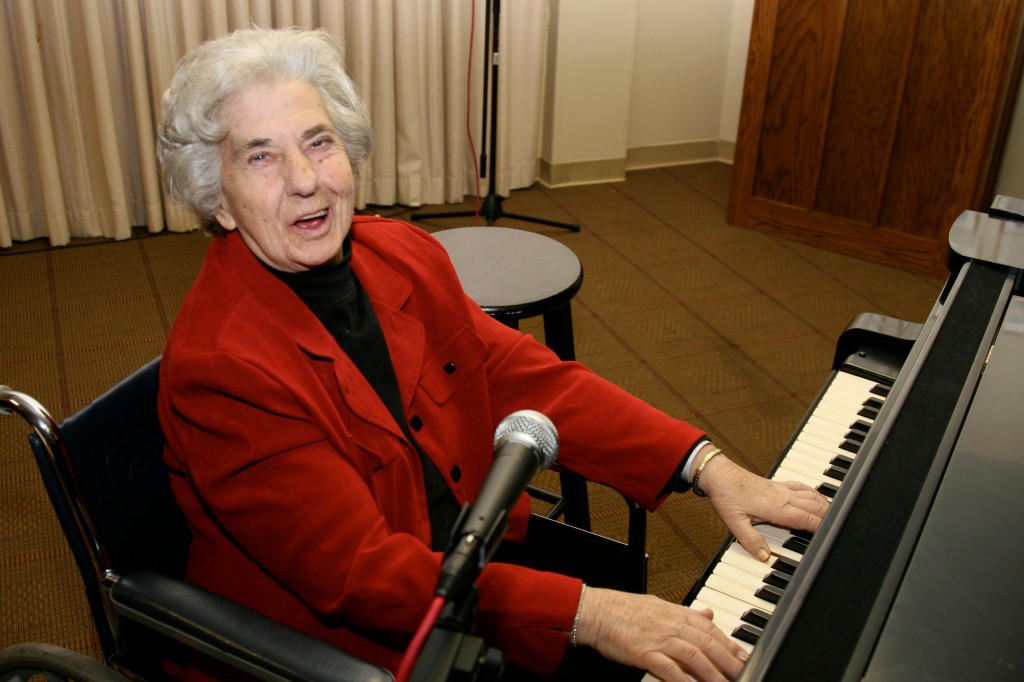
The day she first realized that her toes were gone and said, “I can’t find my toes”—nearly four months after the operations—will always be a difficult memory for me. Not knowing how to respond, I tried the lighthearted approach. “Oh, don’t worry, Mom. We’ll find them.”
Her upbeat attitude, though obviously tainted by the dementia, will always be an example for me, as well. She looked at the little wedge that remained of her foot. “Yeah, they’re probably around here somewhere,” she said.
One of my favorite incidents that I didn’t use in the book was when my mom took home a cardboard box from church and then suffered enormous “spiritual conviction” for stealing it. It happened like this:
At church in Florida, Mom often went along with my brother Tink, a professional music producer and audio engineer, who in addition to his regular “day job,” served as the sound engineer at First Baptist Church in Oviedo. One day, while waiting for Tink to finish packing up the equipment after the service, Mom spied a box containing some CD “jewel packs,” the plastic containers used for protecting CDs. She needed that box for some reason to transport a handful of commemorative items that the church had been giving out. Each parishioner was supposed to take one. Mom took a dozen or more. But she couldn’t carry them all, so she needed that box. When nobody was looking, she surreptitiously removed the jewel cases from the box, and placed the cases on the shelf. Then she loaded her treasures into the box.
Later that afternoon, another of the engineers came into the control room, and was copying CDs. He noticed the empty jewel cases sitting out on the shelf. “Where’s the box for all these jewel cases?” he asked my brother. Tink took one look, and he knew exactly where the box was.
Keep in mind, this was not an antique box worth thousands of dollars. It was an ordinary cardboard box containing CD jewel packs. But my mom was so convicted about stealing it, she repented about a hundred times. She called my brothers, asking their forgiveness. She called me in Tennessee, bawling, asking me to ask God to forgive her.
“Mom, I’m sure the Lord has forgiven you,” I tried to console her.
“No, no, it’s terrible. I stole the box. You know me; I’ve never stolen anything in my life!”
For a fleeting moment I considered reminding her about all those sugar packets, but then I thought better of that idea.
This went on for several days. Every time I talked with her by phone, which I did at least once a day, she’d bring up about her stealing the box.
“Well, Mom, you just need to take the box back and apologize to the audio guys at the church. Tell them the truth. You didn’t think anyone would mind if you used the box to carry your things.”
“Oh, no! I couldn’t do that.”
“Why not?”
“Because then they’ll know that I took the box.”
“So what?”
“Ken, that’s stealing!”
“Oh.”
True story!
In the book, you write about taking your mom to different nursing homes, watching as they tried to save her leg from gangrene, and even stopping overmedication that is commonplace today. There were so many battles to fight along the way. How did all of this change you and your family?
Walking with my mom through dementia reminded me afresh that this life is not all there is. Sometimes we struggle so tenaciously to hold onto life in this world, and we forget that God created us for eternity.
To know that the moment my mom took her last breath at the nursing home in Tennessee, she would take her first breath in heaven was a marvelous affirmation of faith—both hers and mine. Mom believed in God; she maintained a firm faith in Jesus Christ all the way to the end, so I have no doubt that I will see her again in heaven. That knowledge takes the sting out of the heart-wrenching experiences, including death itself.
After your experience, how do you now view dementia?
I acknowledged in the book that prior to our mom developing the disease, I had paid little attention to reports about Alzheimer’s or dementia. At best, I regarded it as a debilitating disease that affected other people, not my family. As we walked with Mom through her dementia years, however, I no longer regarded the disease as an innocuous nuisance. It is not merely destructive; it is deadly. Nobody survives dementia. While the cause of death might be heart failure or a stroke or some other malady, the true culprit in my mom’s demise was dementia shutting down her systems so her own body could no longer fight back. The same scenario is being played out in millions of other lives even as I write these words.
My mom was a strong Christian and a woman of incredible inner strength. She taught me how to live; and throughout her slow, sometimes agonizing years with dementia, she taught me how to die.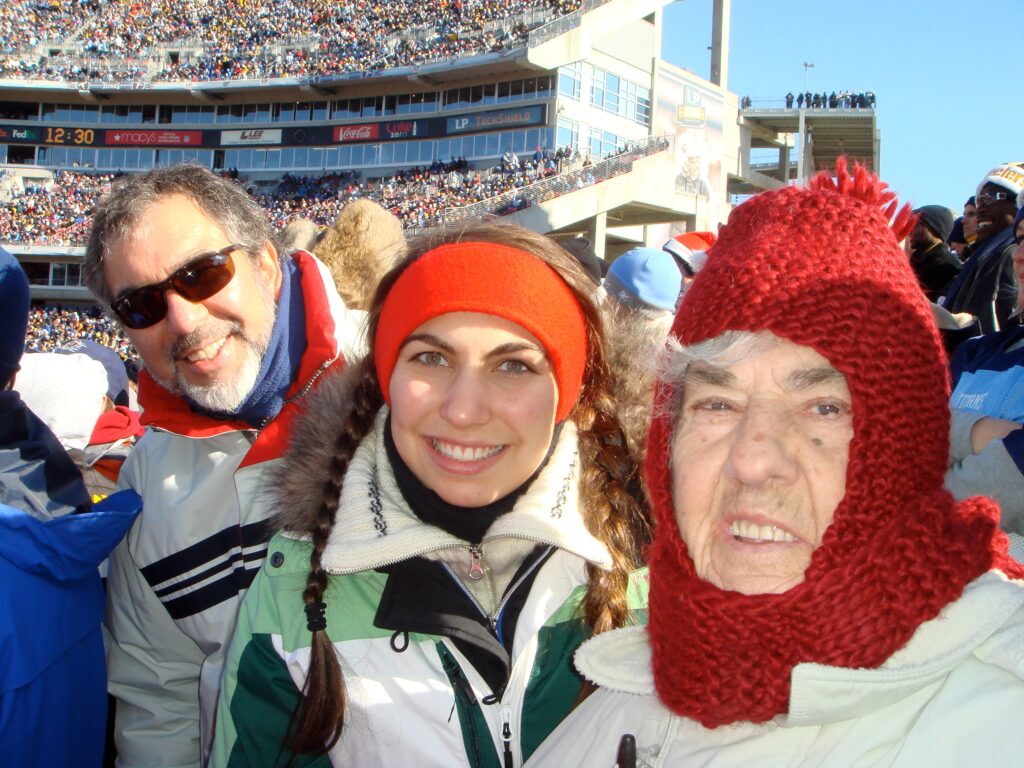
My wife would appreciate this. How about a plug for your Mom’s favorite football team?
I have no doubt that if they have black and gold robes in heaven, Mom is wearing one, cheering as she always has for her Pittsburgh Steelers. She’s been cheering for every Steelers quarterback from Bobby Lane to Terry Bradshaw to Ben Roethlisberger. If they have “Terrible Towels” in heaven, you can be sure my mom will be waving one!
When Your Parent Becomes Your ChildAll photos used by permission. Copyright Ken Abraham.

